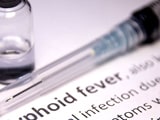Typhoid
What is it?
Typhoid is also known as enteric fever or salmonellosis. Typhoid fever is an acute illness, an infectious disease and is a very common cause of persistent high grade fever. According to the most recent estimates (published in 2014), approximately 21 million cases and 222 000 typhoid-related deaths occur annually worldwide. A similar but often less severe disease, paratyphoid fever, is caused by Salmonella Paratyphi A, B or C (Source: WHO)
Related FAQ: Is my wife suffering from typhoid?
What are the causes?
Typhoid is a bacterial disease caused by Salmonella typhi. A related bacterium called Salmonella paratyphi causes paratyphoid fever. The disease is transmitted by contaminated food or water.
What are the symptoms?
The symptoms of typhoid are non-specific and fever is the main symptom that gradually increases over four to five days. The fever is high grade (up to 40.5ºC or 105ºF) and almost continuous unless some fever-relieving drugs (antipyretics) are taken. The illness is characterized by symptoms like poor appetite, weakness, nausea, headache, constipation and sometimes diarrhoea. The liver and spleen become enlarged. In serious cases perforation of the intestines may occur in a few cases.
How is the diagnosis made?
The patient is examined along with a detailed history of complaints. The patient’s blood is cultured and the causative bacteria can be grown. Their identification and sensitivity to antibiotics is done in the laboratory. This helps in the selection of an effective antibiotic used for treatment. After the second week of illness, antibodies against the bacteria develop and they can be detected in the blood by a test called the Widal test. This test gives equivocal results in the early stages of the disease.
What is the treatment?
A number of antibiotics are available to treat typhoid. Chloramphenicol was an effective drug of the past but is rarely used now due to antibiotic resistance. The newer antibiotics (ciprofloxacin and ofloxacin) are the mainstay of treatment. Recently, resistance of the bacteria to these medicines has been observed in a few cases. In addition to antibacterial drugs, supportive treatment like a soft diet and antipyretics to keep the fever down are needed. In severe cases, the patient may need hospitalisation. If complications like intestinal perforation occur, emergency surgery may be required.
What are the prevention?
Typhoid is prevalent where sanitary conditions are poor. Therefore, a proper water supply and waste disposal system is essential for the prevention of this disease. Safe water for drinking and kitchen use is important. Food should be hygienically prepared and stored. Flies and cockroaches can spread the disease and must be dealt with effectively. Persons handling food should be periodically examined, and their stool examination done.
Vaccines are available for protection against typhoid. The older TAB vaccine is no longer used. Newer oral and injectable vaccines are widely available and provide immunity for approximately two years. The immunity due to the vaccines needs to be boosted every two years by repeat doses.
................... Advertisement ...................
................... Advertisement ...................
................... Advertisement ...................
................... Advertisement ...................
























